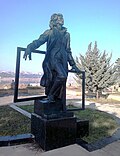Sattar Bahlulzade
Sattar Bahlulzade (Azerbaijani: [Səttar Bəhlulzadə] Error: {{Lang}}: text has italic markup (help); Russian: Саттар Бахлул оглы Бахлулзаде, 15 December [O.S. 2 December] 1909 – 14 October 1974) was an Azerbaijani painter. He was born in the village of Amirjan, just outside the Azerbaijani capital Baku.
| Sattar Bahlulzade | |
|---|---|

| |
| Born | 15 December 1909 Əmircan, Baku, Azerbaijan |
| Died | 14 October 1974 (aged 64) Moscow, Russian SFSR |
| Nationality | Azerbaijani |
| Field | Landscape art, Impressionism |

Sattar Bahlulzade is the founder of modern Azerbaijani landscape painting. He began his professional education at the National Art Institute in Baku (1927–1931). In 1933, he went to Moscow to continue his education in the Drawing Department at the Moscow Fine Arts Institute. There he studied in the studio of the Russian painter V. A. Favorsky. During the summer workshops in Crimea, Russian painter G. Shegal saw some of Sattar's sketches and suggested that he study at the institute's Painting Department, which he did.
Though he experimented in many styles of art, his unique talent was landscape painting. At first, he used to paint nature realistically as he had been taught. But soon he developed his own style. In fact, some of his paintings look like photos of the Earth taken from space. Using a combination of pastel colors and bold strokes, he made nature look more colorful and lively, and sometimes even more fantastic, than it did in reality.
Many of his works show different places of Azerbaijan. For example, "Bazarduzu Outskirts" is about Bazarduzu, the highest mountain in Azerbaijan. Other examples are "Old Shamakhi" and "Autumn in Nakhchivan."
Bahlulzade won many prizes for his art. He won the title of Honored Art Worker of the Republic of Azerbaijan in 1960 and was named People's Artist in 1963.
In 1973, Sattar became extremely ill due to blood poisoning and he died in 1974 in Moscow. When Sattar died, he was not buried in the Avenue of the Honored Ones, unlike other famous Azerbaijani people. Instead, according to his will, he was buried in his native village of Amirjan, next to his mother's grave.
Sattar's legacy includes many works that have been shown all over the world, including personal exhibitions in the USA, England, Turkey and Russia.
Most of his works are shown in museums all over Azerbaijan, particularly in the cities like Baku, Ganja and Nakhchivan.
Some of his most famous works are:
- Gudialchay Valley (1953)
- Evening above Caspian Sea (1959)
- Spring of my Native Land (1967)
Gallery
Saffron with Pomegranate.
Sattar Bahlulzade Media
Relief of Bahlulzade on his house
Monument of Bahlulzade on his grave in Amirjan
Other websites
- Sattar Bahlulzade, The Vibrant Pulse of Nature Azerbaijan International Magazine
- View Bahlulzade paintings at AZgallery.org.
- Sattar Bahlulzadeh
- Bahlulzadeh in headlines Archived 2006-02-23 at the Wayback Machine









